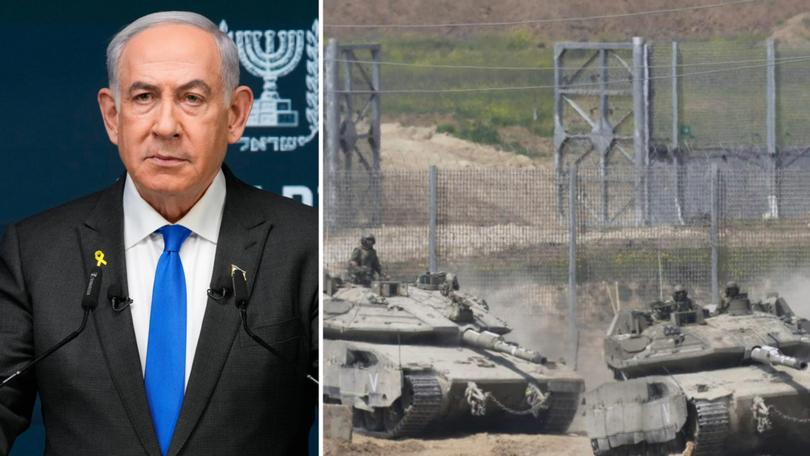Israeli Prime Minister Benjamin Netanyahu says new Israeli corridor to divide Gaza Strip as areas seized
Israel has announced a major expansion of military operations in the Gaza Strip, saying large areas of the enclave would be seized and added to its security zones while certain areas would be cleared.

Israel has announced a major expansion of military operations in the Gaza Strip, saying large areas of the enclave would be seized and added to its security zones while certain areas would be cleared of residents.
Prime Minister Benjamin Netanyahu said troops were seizing an area he called the Morag Axis, a reference to a former Israeli settlement once located in an area between the cities of Rafah and Khan Younis in the south of the Gaza Strip.
“Because we are now dividing the Strip and we are increasing pressure step by step so they will give us our hostages,” he said in a video message.
Sign up to The Nightly's newsletters.
Get the first look at the digital newspaper, curated daily stories and breaking headlines delivered to your inbox.
By continuing you agree to our Terms and Privacy Policy.He said the move, which would cut off Rafah from Khan Younis, would give Israel control of a second axis in the south of the enclave in addition to the so-called “Philadelphi Corridor,” running along the border with Egypt, which Israel sees as a key line preventing the smuggling of weapons into the Gaza Strip.
Separately, the Israeli military said troops had completed the encirclement of the Tel al-Sultan area near Rafah and killed dozens of militants.
It had also found two rockets as well as a launcher aimed at Israeli territory.
Earlier on Wednesday, Defence Minister Israel Katz announced that troops would be expanding their operation in the Gaza Strip to clear out militants and infrastructure “and seize large areas that will be added to the security zones of the State of Israel”.
The Israeli military had already issued evacuation warnings to people living in some southern districts and Palestinian radio reported that the area around Rafah was almost completely empty following an evacuation order.
Gaza’s Health Ministry said at least 60 people were killed in Israeli strikes on Wednesday, with 19 people, including children, killed in a strike at a United Nations clinic being used to house displaced people.
Israel’s military said it had struck a building previously used as a clinic that it said was serving as a Hamas command and control centre to plan attacks, and that the military had used surveillance to mitigate the risk to civilians.
Hamas denied using the building and called the Israeli accusation that it did so a “blatant fabrication”.
Reuters video of the aftermath of the strike showed blood on the floor as rescue workers removed bodies on stretchers.
At the site of another strike in Khan Younis, Rida al-Jabbour held up a tiny shoe and pointed at a blood-spattered wall as she related how a neighbour had been killed along with her three-month-old baby.
“From the moment the strike occurred, we have not been able to sit or sleep or anything,” she said, describing how rescue workers were unable to separate the remains of those killed.
Mr Katz’s statement did not make clear how much land Israel intended to seize or whether the move represented a permanent annexation of territory, which would add further pressure on a population already living in one of the most crowded areas in the world.
“It seems like Netanyahu will not stop his war on Gaza until we are displaced,” said Amer al-Farra, a Palestinian in Gaza, who said he had been displaced eight times during the war.
“With God’s will we will remain steadfast.”
Israeli leaders have been encouraged by signs of protest in the Gaza Strip against Hamas, the militant group which has controlled the enclave since 2007, and the expanded operation appeared at least partly aimed at increasing civilian pressure on its leaders.
“I call on the residents of Gaza to act now to eliminate Hamas and return all the kidnapped,” Mr Katz said in his statement.
“This is the only way to end the war.”
Israel invaded the Gaza Strip following an attack on southern Israel by thousands of Hamas-led gunmen that killed 1200 people according to Israeli tallies, as 251 hostages were taken.
The Israeli campaign has killed more than 50,000 people, according to Palestinian health officials, and ravaged the Gaza Strip.
